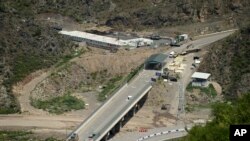The humanitarian situation in Nagorno-Karabakh remains precarious, even as aid shipments are beginning to arrive again in the breakaway region of Nagorno-Karabakh.
Late last year, the government of Azerbaijan began blockading the Lachin Corridor, in violation of its ceasefire with Armenia. According to the International Committee of the Red Cross, all humanitarian assistance through the Lachin Corridor was stopped for several weeks. This action led to a humanitarian crisis for the tens of thousands of people in Nagorno-Karabakh.
The United States had called for the simultaneous opening of the Lachin and Aghdam routes to allow for additional desperately needed humanitarian supplies to reach the men, women, and children in Nagorno-Karabakh. Moreover, Secretary of State Antony Blinken warned leaders “against taking any actions that raise tensions or distract from this goal.”
“We have consistently stressed this need for open routes in Nagorno-Karabakh and for a dialogue between the parties,” said State Department Spokesperson Matthew Miller in a recent briefing:
“While it is important that Nagorno-Karabakh have credible representatives for this process, as we have said in the past, we do not recognize Nagorno-Karabakh as an independent and sovereign state, and therefore we do not recognize the results of those so-called presidential elections that were announced over the last few days.”
Armenia and Azerbaijan have fought two wars for control of Nagorno-Karabakh, with the last fighting in 2020 ending in a Russian-brokered ceasefire that led to Armenia ceding territory under its control.
The United States is committed to pursuing mediation efforts between Baku and Yerevan in an effort to reach a lasting peace settlement,” said Spokesperson Miller:
“So, I will say that the United States will continue to strongly support efforts by Armenia and Azerbaijan to resolve outstanding issues through direct dialogue, and that’s why Secretary Blinken and Senior Advisor for Caucasus Negotiations Lou Bono have been consistently engaged, and we will stay consistently engaged on this question.”
The United States is committed to promoting a peaceful, democratic, and prosperous future for the South Caucasus region.














